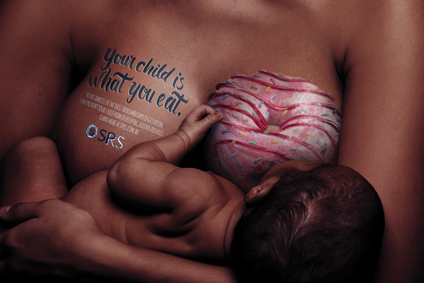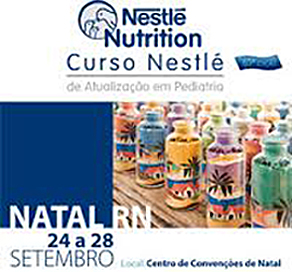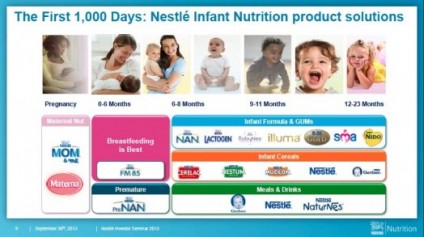If you thought that these ads were powerful, disturbing and upsetting, wait until you hear this: the ads may be part of a stealth Nestle campaign to promote formula feeding.
Ostensibly, Sociedade de Pediatria do Rio Grande do Sul has embarked upon a campaign to convince breastfeeding women that:
Your child is what you eat. Yours habits in the first thousand days of gestation can prevent your child from developing serious diseases.
My first thought on viewing the images was that scaring breastfeeding mothers is a terrible way to promote breastfeeding.
That may be the point. It turns out that these images may actually be part of a stealth ANTI-breastfeeding campaign promoted by Nestle.
I was alerted to this possibility by Baby Milk Action UK which describes itself as “as part of a global network [that] acts to stop misleading marketing by the baby feeding industry.”
The campaign raises a number of red flags:
1. The ads are sponsored by Sociedade de Pediatria do Rio Grande do Sul, an organization that receives substantial funding from Nestle. Each year the Sociedade sponsors a refresher course in pediatrics that prominently features Nestle.
[pullquote align=”right” color=”#415461″]There is no scientific evidence that eating junk food affects the quality of breastmilk.[/pullquote]
Nestle has a checkered history in Brazil. According to this physician’s blog (Google translated from Portugese):
Going back a little in time, around the 1950s, Nestlé came to Brazil selling the idea that her milk was better and more nutritious than breast milk. In the decade of the 50/60 contests were common “children’s strength” where the mother sent a picture of the chubby baby in front of a pyramid Nest milk cans (that I saw personally, no one told me). Quickly breastfeeding turned “poor thing”. Only I nursed who could not buy milk nest.
Also happened to representatives of the brand go to hospitals and distribute free samples of their milk for families, doctors and nurses.
In Africa, this has had a devastating effect and became a big scandal: the mothers received free samples of infant formula, and then weaned their children could not afford to buy more milk, or sanitize bottles. Hundreds of children died of malnutrition and gastroenteritis as a result of “generosity” Nestlé.
Any resemblance to the strategy used by drug traffickers is no coincidence.
This position paper (Google translated from Portugese) describes Nestle’s current strategy:
…The case describes the way as Nestlé has been developing integrated communication infant feeding, associating your image science, by investing in Research and Development products, channels of open dissemination of research on pediatrics and nutrology, the establishing partnerships, sponsorship and promotion of events aimed at professionals these areas, potential influencers together to buyers Mothers milk powder infants, and its strategic adaptation to environmental influence of regulatory procedures established by the National Health Council since 1988. The case presents itself as problem situation the efforts made by Nestle in an attempt to influence the class medical, important opinion leaders on children’s products and thus their position brands with security associations, care and quality…
2. The ad campaign appears to be very high quality and likely very expensive. While it is certainly possible that a pediatric society would expend a large amount of money on an ad campaign, it seems like an unusual use of funds.
3. The ads are in English and were rolled out in an English language publication, the Daily Mail:
A disturbing new advertising campaign warns expectant mothers about the effects their food and drink intake can have on their unborn children – by showing young babies suckling on breasts that have been painted to look like a variety of unhealthy treats.
The alarming ads, created for Brazil’s Pediatric Society of Rio Grande (SPRS), also feature the ominous tagline: ‘Your child is what you eat,’…
Designed by Brazilian-based agency Paim, the ads are a startling reminder that mothers can potentially harm their young babies with their poor diets.
The article suggests that the Daily Mail received the information on the campaign directly from the ad agency, and not from the SPRS. Indeed, the ads do not appear on the SPRS website.
According to José Pedro Bortolini, one of the creators of the campaign, the ads will appear in Portugese. Bortolini, commenting on the Milk Action website, claims:
This campaign WAS NOT sponsored by Nestle in anyway whatsoever. It was comissioned by the Pediatric Society of Rio Grande do Sul (a state in Brazil) to raise awareness about the first 1000 days of a child, from the gestation to the first two years of his life. The brief was to promote a healthy diet of a mother can bring benefits to the baby.
4. Nutrition in the first 1000 days? Where have I heard that phrase before? Oh, I know. It’s part of Nestle’s formula marketing campaign.
What an amazing coincidence!
5. The images have no basis in fact. Your breastfed baby is NOT what you eat. There is no scientific evidence of any kind that eating junk food affects the quality of breastmilk. The Daily Mail article notes:
A recent study by Robert Waterland, an Associate Professor of Pediatrics and Molecular and Human Genetics at Baylor College of Medicine, found that healthy diets of pregnant mothers can result in babies developing a gene variant that suppresses tumors.
But the investigators in that study looked at Gambian women and compared those who conceived when food was plentiful with those who conceived when it was scarce. The study was about the impact of starvation in pregnancy. It had nothing to do with breastfeeding at all, which raises the question as to why it is mentioned in connection with this ad campaign.
6. The images are meant to scare breastfeeding women from breastfeeding. As a commentor on the Milk Action website noted:
Let’s be honest here, if you wanted to promote healthy diets an lifestyles you’d have painted broccoli and apples on the breasts and made it a positive ad…
The ads don’t encourage breastfeeding; they discourage breastfeeding for fear of harming a child’s health if the mother doesn’t have a perfect diet.
Taken together, these 6 points support the disturbing possibility that these ads are not an effort to promote breastfeeding, but a stealth effort to promote formula feeding.
If it turns out that this is the case, the ads are not merely powerful, disturbing and upsetting; they are reprehensible.






